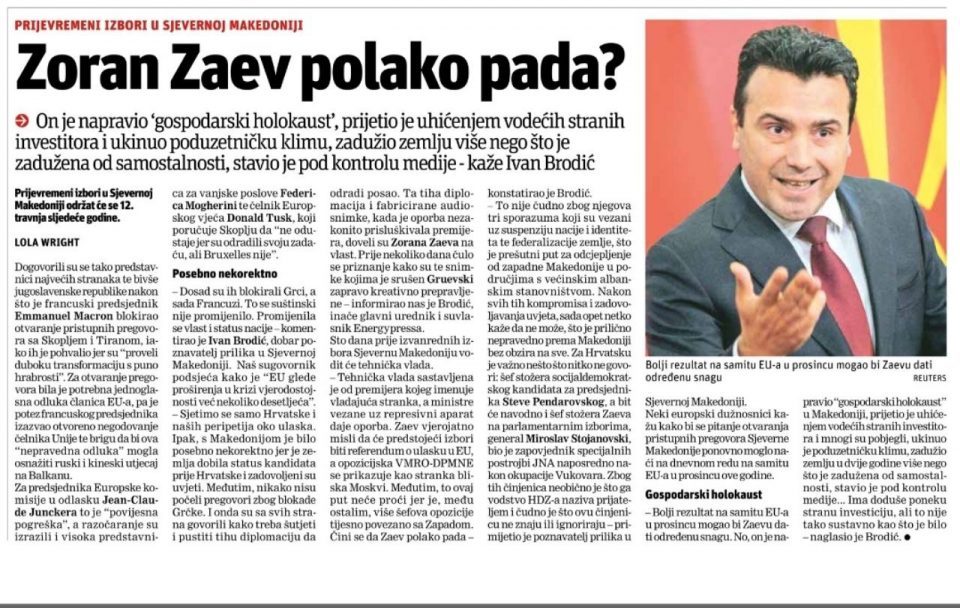Croatian daily “Slobodna Dalmacija” predicts the fall of the Zoran Zaev Government in Macedonia, after his defeat at the European Council and the failure to open EU accession talks. Croatian commentator Ivan Brodic, who frequently covers Macedonia, sees the early elections Zaev was forced to call as part of the slow fall of his Government.
Macedonia was blocked by the Greeks, and now they are blocked by the French. In essence, nothing changed, except that the Government was replaced and so was the character of the nation, Brodic says about the name and identity change which Zaev imposed on Macedonia.
Croatia also faced an EU blockade back in the day, in their case it came from Slovenia, but Brodic says that it was nothing like the pressure against allowing Macedonia to join the EU. It eventually led to a push to remove the Macedonian Government and bring one that will approve major concessions, on the hope that will allow the opening of accession talks.
The country met all conditions and became a candidate state before Croatia, but they were not allowed to open accession talks because of Greece. On all sides they were told to stay quiet and let quiet diplomacy work. That quiet diplomacy, and a number of fabricated audio tapes by the opposition which was illegally wiretapping the Prime Minister, led to Zoran Zaev’s take over of power. Just days ago we could hear a confession that the tapes, which brought down Nikola Gruevski, were actually manipulated, Brodic adds.
And still, Zaev’s concessions were not enough to open accession talks.
Zaev carried out an economic Holocaust in Macedonia, threatened top foreign investors with arrests, disturbed the business climate and indebted the country to record levels since its independence. He put the media under his control, but now all of this indicates that his Government is falling, especially after the agreement to hold early elections in April. Zaev hopes that he will be able to paint the coming elections as a battle for the EU, and to portray the opposition VMRO-DPMNE party as affiliated with Moscow, but this strategy won’t fly again, because many of the opposition leaders njow also are closely linked to the West. This all means that Zaev is slowly going down, Brodic told “Slobodna Dalmacija”.
A big reason for Zaev’s unpopularity, he adds, are the treaties with Bulgaria and Greece, and the introduction of bilingualism in Macedonia, which were rejected by the citizens, but also lead toward federalization and partition of Macedonia.
In conclusion, Brodic reminds the Croatian authorities that the Zaev Government has again elevated retired General Miroslav Stojanovski, the once Chief of Staff under President Crvenkovski, who was a special forces commander during the Yugoslav Army siege of Vukovar in 1991. Stojanovski was charged by surviving Croatian civilians with war crimes, and was retired under the VMRO-DPMNE Government, but has been plucked from retirement and made an important adviser to SDSM Defense Minister Radmila Sekerinska.




Comments are closed for this post.